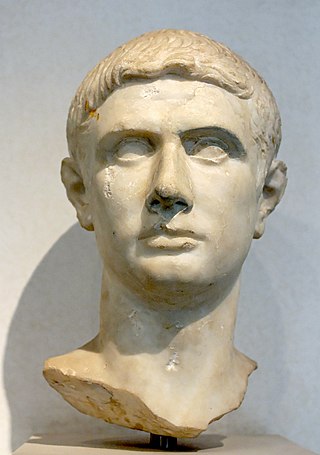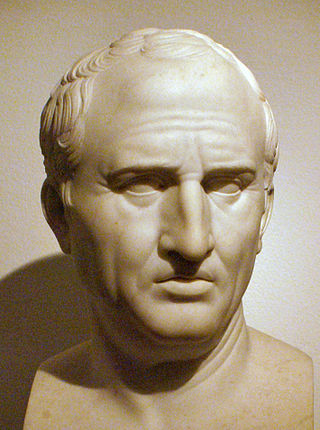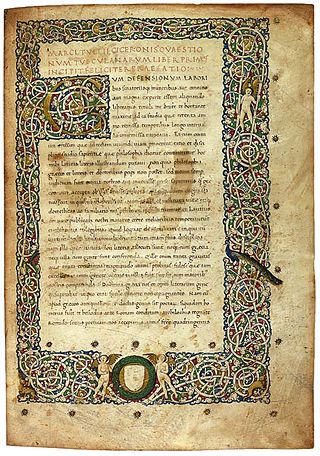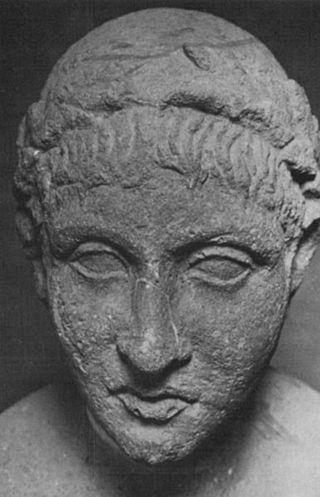
Quintus Ennius was a writer and poet who lived during the Roman Republic. He is often considered the father of Roman poetry. He was born in the small town of Rudiae, located near modern Lecce, a town founded by the Messapians, and could speak Greek as well as Latin and Oscan. Although only fragments of his works survive, his influence in Latin literature was significant, particularly in his use of Greek literary models.

Marcus Porcius Cato, also known as Cato the Censor, the Elder and the Wise, was a Roman soldier, senator, and historian known for his conservatism and opposition to Hellenization. He was the first to write history in Latin with his Origines, a now fragmentary work on the history of Rome. His work De agri cultura, a rambling work on agriculture, rituals, and recipes, is the oldest extant prose written in the Latin language. His epithet "Elder" distinguishes him from his great-grandson Cato the Younger, who opposed Julius Caesar.

Lucius Livius Andronicus was a Greco-Roman dramatist and epic poet of the Old Latin period during the Roman Republic. He began as an educator in the service of a noble family, producing Latin translations of Greek works, including Homer's Odyssey. The translations were meant, at first, as educational devices for the school which he founded. He also wrote works for the stage—both tragedies and comedies—which are regarded as the first dramatic works written in the Latin language. His comedies were based on Greek New Comedy and featured characters in Greek costume. Thus, the Romans referred to this new genre by the term comoedia palliata or fabula palliata, meaning "cloaked comedy," the pallium being a Greek-style cloak. The Roman biographer Suetonius later coined the term "half-Greek" of Livius and Ennius. The genre was imitated by later generations of playwrights, and Andronicus is accordingly regarded as the father of Roman drama and of Latin literature in general; that is, he was the first man of letters to write in Latin. Varro, Cicero, and Horace, all men of letters during the subsequent Classical Latin period, considered Livius Andronicus to have been the originator of Latin literature. He is the earliest Roman poet whose name is known.

In publishing and graphic design, Lorem ipsum is a placeholder text commonly used to demonstrate the visual form of a document or a typeface without relying on meaningful content. Lorem ipsum may be used as a placeholder before the final copy is available. It is also used to temporarily replace text in a process called greeking, which allows designers to consider the form of a webpage or publication, without the meaning of the text influencing the design.

The Parallel Lives is a series of 48 biographies of famous men written by the Greco-Roman philosopher, historian, and Apollonian priest Plutarch, probably at the beginning of the second century. It is also known as Plutarch's Lives ; Parallels ; the Comparative Lives ; the Lives of Illustrious Men ; and the Lives of the Noble Greeks and Romans.

De Officiis is a 44 BC treatise by Marcus Tullius Cicero divided into three books, in which Cicero expounds his conception of the best way to live, behave, and observe moral obligations. The work discusses what is honorable, what is to one's advantage, and what to do when the honorable and private gain apparently conflict. For the first two books Cicero was dependent on the Stoic philosopher Panaetius, but wrote more independently for the third book.

Cicero's Brutus is a history of Roman oratory. It is written in the form of a dialogue, in which Marcus Junius Brutus and Titus Pomponius Atticus ask Cicero to describe the qualities of all the leading Roman orators up to their time. Cicero then attempts to propose a reconstruction of Roman history. Although it is written in the form of a dialogue, the majority of the talking is done by Cicero with occasional intervention by Brutus and Atticus. The work was probably composed in 46 BC, with the purpose of defending Cicero's own oratory. He begins with an introductory section on Greek oratory of the Attic, Asiatic, and Rhodian schools, before discussing Roman orators, beginning with Lucius Junius Brutus, "The Liberator", though becoming more specific from the time of Marcus Cornelius Cethegus.

De re publica is a dialogue on Roman politics by Cicero, written in six books between 54 and 51 BC. The work does not survive in a complete state, and large parts are missing. The surviving sections derive from excerpts preserved in later works and from an incomplete palimpsest uncovered in 1819. Cicero uses the work to explain Roman constitutional theory. Written in imitation of Plato's Republic, it takes the form of a Socratic dialogue in which Scipio Aemilianus takes the role of a wise old man.

De Divinatione is a philosophical dialogue about ancient Roman divination written in 44 BC by Marcus Tullius Cicero.
Critolaus of Phaselis was a Greek philosopher of the Peripatetic school. He was one of three philosophers sent to Rome in 155 BC, where their doctrines fascinated the citizens, but frightened the more conservative statesmen. None of his writings survive. He was interested in rhetoric and ethics, and considered pleasure to be an evil. He maintained the Aristotelian doctrine of the eternity of the world, and of the human race in general, directing his arguments against the Stoics.

The Tusculanae Disputationes is a series of five books written by Cicero, around 45 BC, attempting to popularise Greek philosophy in Ancient Rome, including Stoicism. It is so called as it was reportedly written at his villa in Tusculum. His daughter had recently died and in mourning Cicero devoted himself to philosophical studies. The Tusculan Disputations consist of five books, each on a particular theme: On the contempt of death; On pain; On grief; On emotional disturbances; and whether Virtue alone is sufficient for a happy life.

Laelius de Amicitia is a treatise on friendship (amicitia) by the Roman statesman and author Marcus Tullius Cicero, written in 44 BC.

De agri cultura, also known as On Farming or On Agriculture, is a treatise on Roman agriculture by Cato the Elder. It is the oldest surviving work of Latin prose. Alexander Hugh McDonald, in his article for the Oxford Classical Dictionary, dated this essay's composition to about 160 BC and noted that "for all of its lack of form, its details of old custom and superstition, and its archaic tone, it was an up-to-date "treatise" constructed from his own knowledge and experience to the new capitalistic farming." Cato was revered by many later authors for his practical attitudes, his natural stoicism and his tight, lucid prose. He is much quoted by Pliny the Elder, for example, in his Naturalis Historia.

Publius Cornelius Scipio Nasica Corculum was a politician of the Roman Republic. Born into the illustrious family of the Cornelii Scipiones, he was one of the most important Roman statesmen of the second century BC, being consul two times in 162 and 155 BC, censor in 159 BC, pontifex maximus in 150 BC, and finally princeps senatus in 147 BC.

De Natura Deorum is a philosophical dialogue by Roman Academic Skeptic philosopher Cicero written in 45 BC. It is laid out in three books that discuss the theological views of the Hellenistic philosophies of Epicureanism, Stoicism, and Academic Skepticism.

Ceterum (autem) censeo Carthaginem esse delendam, often abbreviated to Carthago delenda est or delenda est Carthago, is a Latin oratorical phrase pronounced by Cato the Elder, a politician of the Roman Republic. The phrase originates from debates held in the Roman Senate prior to the Third Punic War between Rome and Carthage. Cato is said to have used the phrase as the conclusion to all his speeches, to push for the war.
Gaius Laelius Sapiens, was a Roman statesman, best known for his friendship with the Roman general and statesman Scipio Aemilianus. He was consul of 140 BC, elected with the help of his friend, by then censor, after failing to be elected in 141 BC. Gaius Laelius Sapiens was the son and heir of the Punic War general Gaius Laelius, himself consul in 190 BC. This Laelius had been former second-in-command and long-time friend, since childhood, of the Roman general and statesman Scipio Africanus. The younger Laelius was apparently born around 188 BC, after his father had become consul but had failed to win command of the campaign against Antiochus III the Great of Syria, which would have made him a rich man. His mother's name is unknown.

O tempora, o mores is a Latin phrase that translates literally as "Oh the times! Oh the customs!", first recorded to have been spoken by Cicero. A more natural, yet still quite literal, translation is "Oh what times! Oh what customs!"; a common idiomatic rendering in English is "Shame on this age and on its lost principles!", originated by the classicist Charles Duke Yonge. The original Latin phrase is often printed as O tempora! O mores!, with the addition of exclamation marks, which would not have been used in the Latin written in Cicero's day.

The writings of Marcus Tullius Cicero constitute one of the most renowned collections of historical and philosophical work in all of classical antiquity. Cicero was a Roman politician, lawyer, orator, political theorist, philosopher, and constitutionalist who lived during the years of 106–43 BC. He held the positions of Roman senator and Roman consul (chief-magistrate) and played a critical role in the transformation of the Roman Republic into the Roman Empire. He was extant during the rule of prominent Roman politicians, such as those of Julius Caesar, Pompey, and Marc Antony. Cicero is widely considered one of Rome's greatest orators and prose stylists.
The gens Laelia was a plebeian family at Rome. The first of the gens to obtain the consulship was Gaius Laelius in 190 BC.

















